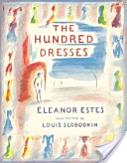The Hundred Dresses, by Eleanor Estes (illus. Louis Slobodkin)
Wanda Petronski lives on the wrong side of the tracks. She comes to school every day in the same ratty blue dress. She sits in the back corner of the classroom where the rowdy boys sit. But she’s too unsure of herself to be rowdy. The popular girls don’t pay Wanda a lot of attention except for a game they play every morning in the school yard:
“Wanda,” Peggy would say in a most courteous manner, as though she were talking to Miss Mason or to the principal perhaps. “Wanda,” she’d say, giving one of her friends a nudge, “tell us. How many dresses did you say you had hanging up in your closet?”
“A hundred,” said Wanda.
“A hundred!” exclaimed all the girls incredulously, and the little girls would stop playing hopscotch and listen.
Every day she wears the same dress, but every day she claims to have a hundred dresses in her closet, “all lined up”–velvet, silk, every color, every style. The girls’ persistence in tormenting Wanda every morning is matched by Wanda’s persistence in her outlandish sartorial claims–not just a hundred dresses, but fifty shoes, then sixty, plus hats and coats to match.
Eleanor Estes’s portrayal of schoolroom dynamics–especially the not-quite intentional hurts that children do to one another–is spot-on. There is so much sadness in this little eighty-page book, which was first published in 1944. Wanda has no answer for the popular girls whose lives are so easy by comparison–only those face-saving claims that are all the more humiliating for their overt falsehood. A hundred dresses, all lined up.
I have heard forgiveness defined as “The fragrance that the flower leaves on the heel of the one who crushed it.” I could never quite make sense of that idea until I read the end of The Hundred Dresses. Wanda’s generosity toward the girls who have so sweetly bullyragged her is genuinely moving. I hope you’ll get hold of a copy and read it for yourself.









Rebecca LuElla Miller
There are many–Bambi, Black Beauty, Old Yeller, The Yearling. But hands down, for me at least, is Where the Red Fern Grows.
Becky
Jonathan Rogers
Why has it taken this long for The Yearling to come up? What a book! Of course The Yearling. One of the lonesomest books ever. I love that book.
Jenni
Ohhh, I remember this book! 🙂 I had nearly forgotten it, for it always seemed to me to be slightly depressing…but I think it did impact me, because (as an adult) I can’t stand to see anybody be looked down on because of their social status.
Drew
We have a copy of The Hundred Dresses at home — one of those books I bought for my daughters when they were way too young to understand more than “Grbl blargl”. And now that they are 7 and 5, I could read The Hundred Dresses to them. (They can almost read it for themselves.) But I don’t. For some reason I feel like I don’t want to burden them with the knowledge that the world is full of unkind people. I’m sure they already understand this, but it feels cruel somehow to read them a bedtime story that would end their day on a sad note.
Granted, it’s a perfect story for showing how not to be. But it turns out I’m exactly the sort of parent I swore I’d never be: overly protective.
This reminds me — when we reached the end of Narnia earlier this year with “The Last Battle” and my oldest daughter asked me, as things got darker and darker for Our Heroes, whether everything would be all right in the end. All I could tell her was what was said in the novel: all worlds come to an end except Aslan’s country.
Also, “The Yearling” is a fantastic book that gets wrongly diminished by being classified as a Children’s Book. The thing won a Pulitzer Prize, peeps!
Heather Ivester
I was in a bookstore over the weekend and saw a copy of The Hundred Dresses, so I picked it up to give to my 10-year-old daughter for Christmas. I don’t remember ever reading it before, but what an amazing story. This printing, from 2004, included an introduction by Eleanor Estes’ daughter, Helena Estes. She explained that the story was based on a real classmate her mother knew growing up. The little Polish girl was teased until she moved away to a bigger city, and Eleanor never had a chance to say she was sorry.
Helena Estes writes:
“What could she do so many years later, my mother wondered, to set things right–to reach out to the girl who had stood lonely and silent against the red brick wall of the school? Well, she thought, the one thing she could do was to write her story. And so The Hundred Dresses was born.”
Wow. That’s good medicine for writer’s block.:)